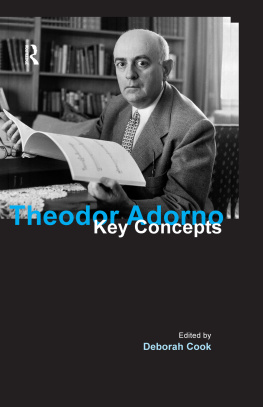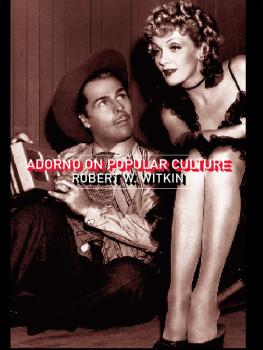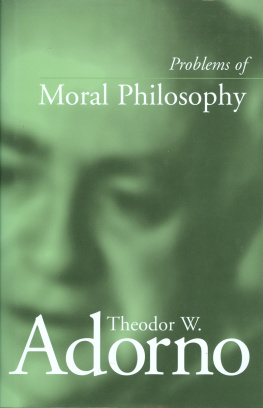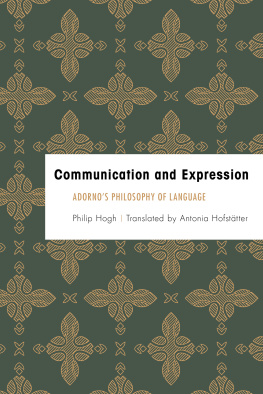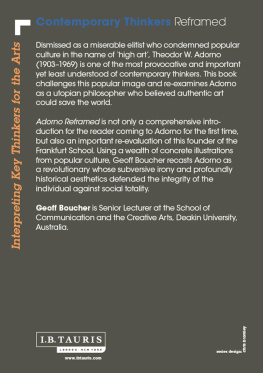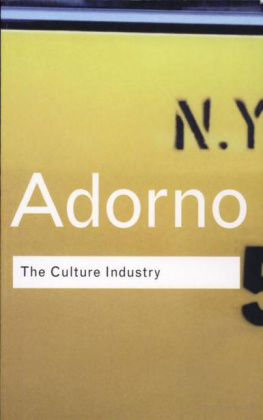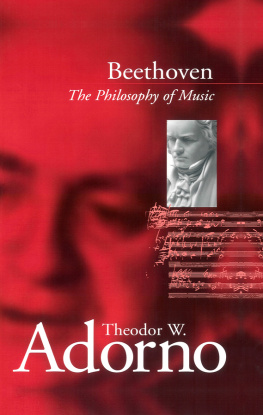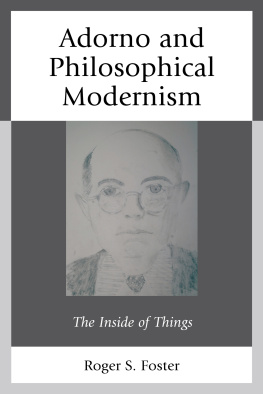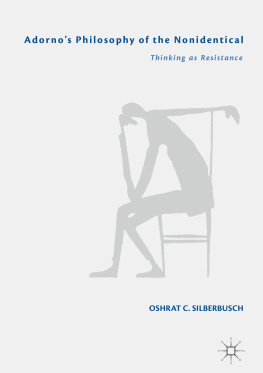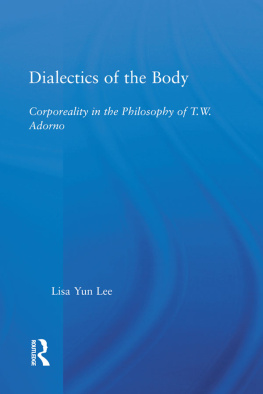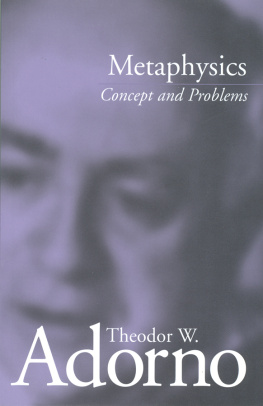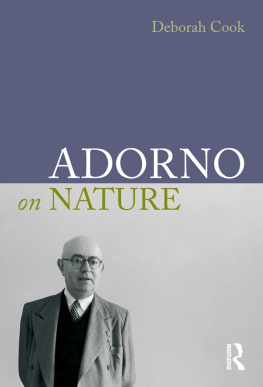Theodor Adorno
Key Concepts
Key Concepts
Published
Theodor Adorno: Key Concepts
Edited by Deborah Cook
Pierre Bourdieu: Key Concepts
Edited by Michael Grenfell
Gilles Deleuze: Key Concepts
Edited by Charles J. Stivale
Merleau-Ponty: Key Concepts
Edited by Rosalyn Diprose and Jack Reynolds
Forthcoming
Michel Foucault: Key Concepts
Edited by Dianna Taylor
Heidegger: Key Concepts
Edited by Bret Davis
Wittgenstein: Key Concepts
Edited by Kelly Dean Jolley
Theodor Adorno
Key Concepts
Edited by Deborah Cook
First Published 2008 by Acumen
Published 2014 by Routledge
2 Park Square, Milton Park, Abingdon, Oxon OX14 4RN
711 Third Avenue, New York, NY 10017, USA
Routledge is an imprint of the Taylor and Francis Group, an informa business
Editorial matter and selection, 2008 Deborah Cook.
Individual contributions, the contributors.
This book is copyright under the Berne Convention.
No reproduction without permission.
All rights reserved. No part of this book may be reprinted or reproduced or utilised in any form or by any electronic, mechanical, or other means, now known or hereafter invented, including photocopying and recording, or in any information storage or retrieval system, without permission in writing from the publishers.
Notices
Practitioners and researchers must always rely on their own experience and knowledge in evaluating and using any information, methods, compounds, or experiments described herein. In using such information or methods they should be mindful of their own safety and the safety of others, including parties for whom they have a professional responsibility.
To the fullest extent of the law, neither the Publisher nor the authors, contributors, or editors, assume any liability for any injury and/or damage to persons or property as a matter of products liability, negligence or otherwise, or from any use or operation of any methods, products, instructions, or ideas contained in the material herein.
ISBN: 978-1-84465-119-1 (hardcover)
ISBN: 978-1-84465-120-7 (paperback)
British Library Cataloguing-in-Publication Data
A catalogue record for this book is available from the British Library.
Typeset by Type Study, Scarborough, North Yorkshire.
Contents
PART I: ADORNO'S INTELLECTUAL
HISTORY AND LEGACY |
| Deborah Cook |
| Deborah Cook |
| Alison Stone |
| Espen Hammer |
| Stle Finke |
| Fabian Freyenhagen |
| Pauline Johnson |
| Marianne Tettlebaum |
| Ross Wilson |
| Robert W. Witkin |
| Brian O'Connor |
Deborah Cook is Professor of Philosophy at the University of Windsor, Canada. Her books include The Culture Industry Revisited: Theodor W. Adorno on Mass Culture (1996) and Adorno, Habermas, and the Search for a Rational Society (2004).
Stle Finke is Professor of Philosophy at NTNY, the University of Trondheim, Norway. His recent publications include Approaches to Painting (co-authored with art historian Holger Koefoed) on the Norwegian painter Hvard Vikhagen. His current research deals with Gadamers hermeneutics, language and mimesis.
Fabian Freyenhagen is Professor of Philosophy at the University of Essex, having previously worked at the Universities of Sheffield and Cambridge. His research interests are in moral and political philosophy as well as in modern European philosophy (especially Kant and Adorno). He is currently writing a book-length defence of Adorno's ethics.
Espen Hammer is Professor of Philosophy at the University of Oslo, Norway. Recently a visiting professor at the New School for Social Research, he is currently teaching at the University of Pennsylvania. His publications include Stanley Cavell: Skepticism, Subjectivity, and the Ordinary (2002), Adorno and the Political (2006) and, as editor, German Idealism: Contemporary Perspectives (2007).
Pauline Johnson is Associate Professor and Head of the Department of Sociology at Macquarie University, Sydney. Her recent publications include Habermas: Rescuing the Public Sphere (2006). Her current research seeks to renegotiate the terms in which a contemporary sociology of intimacy conceives the intersections between the private and the public spheres.
Brian O ' Connor is Senior Lecturer in Philosophy at University College Dublin. He is the author of Adornos Negative Dialectic: Philosophy and the Possibility of a Critical Rationality (2004) and editor of The Adorno Reader (2000). Among his contributions to other aspects of German philosophy is German Idealism: An Anthology and Guide (2006), which he edited with Georg Mohr.
Alison Stone is Senior Lecturer in Philosophy at Lancaster University. She works in post-Kantian European philosophy, feminist philosophy and political philosophy. Her books include Petrified Intelligence: Nature in Hegels Philosophy (2004), Luce Irigaray and the Philosophy of Sexual Difference (2006) and An Introduction to Feminist Philosophy (2007).
Marianne Tettlebaum is Visiting Assistant Professor of German at Hendrix College, USA. She is currently at work on a book-length study entitled Adornos Lightheartedness Mozarts Sadness , which examines the role of the concepts of lightheartedness and childhood in Adorno's analysis of the German philosophical tradition.
Ross Wilson is a Leverhulme Trust Early Career Fellow in the Faculty of English, University of Cambridge, and a Fellow of Emmanuel College, Cambridge. He is the author of Subjective Universality in Kants Aesthetics (2007) and of Theodor Adorno (2008).
Robert W. Witkin is Professor of Sociology at the University of Exeter, and a Fellow of the Centre for Cultural Sociology, Yale University. He is the author of Adorno on Music (1998) and Adorno on Popular Culture (2002).
First to be acknowledged is the sheer hubris involved in crafting essays that purport to introduce a thinker as complex and challenging as Theodor W. Adorno. If this book succeeds in serving as a guide through the intricate labyrinth of Adorno's work, its success is due to the attempts of its expert contributors to make Adorno accessible to a new generation of readers without, as they say in the current vernacular, "dumbing him down". A pleasure to work with, the Adorno scholars whose work appears here have managed to square the circle: to clarify Adorno's thought without simplifying it. They provide readers with the key concepts needed to decipher Adorno's often daunting books and essays.
Appreciation should be extended to others as well. Outstanding scholar Michael Walschots, who helped with editing, offered critical commentary from the refreshing perspective of someone encountering Adorno for the first time. Jeffrey Renaud, whose Masters thesis on Herbert Marcuse I am currently supervising, also offered insightful comments and criticisms. Librarian Johanna Foster was resourceful and diligent in tracking down many works cited in the references. Colleagues Catherine Hundleby and Marcello Guarini afforded me the luxury of several weeks in Toronto to work on editing when they agreed to serve in my place as acting head of the Philosophy Department. For his part, Tristan Palmer at Acumen was always helpful and encouraging in a quietly unobtrusive way.

